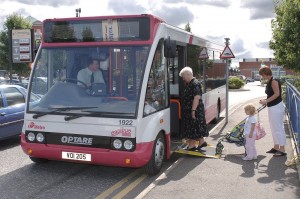 Northern Ireland Assembly, 02 February 2010
Northern Ireland Assembly, 02 February 2010
The removal of the service has generated massive opposition throughout the community, as has been shown by a petition, which local people have been queuing up to sign during the past couple of weeks. The petition was organised by North Down Borough Council’s disabilities committee and the Omnibus Partnership. The council is pleased by that level of support, which highlights the concern that exists in the community.
The decision to remove the Easibus service is widely regarded as unfair and discriminatory. The issue is that minimum savings will create maximum hardship. As Members have already mentioned, although savings of £38,000 are small in the overall Translink budget, the decision to remove the service will affect the most vulnerable, disabled and older people.
When DRD set up the system, it stated that its transport programme for people with disabilities aimed to target social need by improving accessibility of public transport to people with disabilities who cannot avail themselves of existing conventional services; and to complement the work of existing service providers that are involved in programmes that are designed to promote social inclusion for people with reduced mobility. The Bangor Easibus service, which was supposed to improve and complement existing services, is now being taken away.
I am also concerned that the Bangor Easibus service is being withdrawn, yet, as some Members mentioned, the Easibus services in Derry and Belfast have not been considered for withdrawal. Is that decision the tip of the iceberg, and will the Easibus services in Belfast and Derry also be reduced? People are asking why the service in Bangor is being withdrawn.
One might ask what is being lost by withdrawing the service. The buses used for the Easibus service have no steps, easy access and low floors, all of which are extremely important for many disabled people. The hail-and-ride aspect of the Easibus service must also be considered. People were permitted to hail the bus from various points on the main road without having to walk to bus stops. The buses used on the Easibus service are also wheelchair accessible, and they provide a service that delivers the user closer to his or her door. Although a growing number of people require such facilities, they are being taken away.
I do not accept the Department’s argument that the service is underused. As other Members pointed out, the service has approximately 25,000 users annually. That is a significant number of people, many of whom have no alternative source of transport. The Department also argues that the town service bus covers the route, but it does not cover the entire route. In fact, there are parts of the route that the town service bus could not access. As a result, some people will not be able to access buses at all, and, unable to get into town, they will become isolated.
Many Members said that the Easibus service is supposed to be replaced by a door-to-door service. That is a good, valuable and popular service, but it could not meet the current demand on its own. How will it meet the increased demand? For that service to meet the demand would, as Dr Farry said, cost significantly more. On that basis, unless the door-to-door service was to receive massive investment, it could not replace the Easibus service. Furthermore, the door-to-door service does not have the same flexibility as the Easibus service.
Like others, I was annoyed that Translink did not carry out a consultation process, as it has a statutory duty to do. An equality impact assessment should also have been carried out. Equality issues should be considered as part of any decision to withdraw the Easibus service. The decision discriminates against those with disabilities and older people. Therefore, I join my colleagues in asking the Minister to reconsider. The decision could be reversed at minimum cost and doing so would benefit most of the vulnerable sectors of society.
